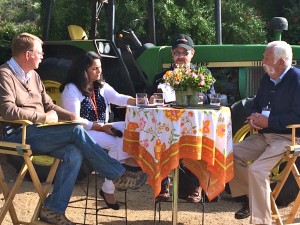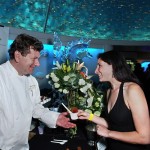 May 19, 2014 – Saying it confuses and misleads shoppers, the Consumers Union is getting ready to launch a nationwide campaign to ban the word “natural” on product labels.
May 19, 2014 – Saying it confuses and misleads shoppers, the Consumers Union is getting ready to launch a nationwide campaign to ban the word “natural” on product labels.
That’s just one story that came out of the Sustainable Foods Institute organized last week by the Monterey Bay Aquarium as part of the Cooking for Solutions festival. Participating chefs and food journalists had a chance to listen to a two-day feast of ideas on how to feed the world’s growing population in times of climate change.
One of the speakers, Dr. Urvashi Rangan, director of safety and sustainability for the Consumers Union, which publishes Consumer Reports, announced it is preparing a campaign to ban the natural label.
“We want to kill the natural label, because it clouds the marketplace,” said Rangan. CU conducted a telephone survey of 1,000 shoppers across the country and found that 30% of those surveyed believed “natural” and “organic” were the same thing.
There are no requirements for most consumer products to be labeled natural, while the organic label requires compliance with 600 pages of USDA national organic standards and certification.
“It’s depressing and that’s why we’re taking it up to a new level,” added Rangan. “What most people don’t know is that the government gives industry permission to do this.”

In the case of “natural” meat, the only requirement is that it contains no artificial colors or preservatives. “It has nothing to do with how the animal was raised, if it was crammed into a barn and never saw the light of day, and almost half the people we surveyed—47%—thought it meant no GMOs in animal feed,” she said.
Beginning in mid-June, the Consumers Union will kick off a public education effort aimed at pressuring the USDA and the Food and Drug Administration to ban the natural label.
“The most credible labels are 3rd party certifications that have standards and can be verified,” said Rangan. “The natural label just muddies things up, there is too much confusion and it does not meet expectations of consumers.”
She says personal care products and cleaners are some of the worst offenders. “It’s simply a marketing effort, used because people equate it with being more safe.”
“People don’t want things that are artificial and they’re willing to pay a little more for it, but they’re often getting misled at the market,” she said.
The campaign will culminate with a conference on consumer labeling in San Francisco on September 19. Good to keep in mind is something Eric Schlosser wrote in his book Fast Food Nation: “If they have to put the word ‘natural’ on a box to convince you, it probably isn’t.”
Other speakers at the Institute focused on new ways to feed the world’s population, which is predicted to balloon to 9 billion by 2050.
Ideas covered a broad spectrum. Some speakers, like Ethan Brown of a company called Beyond Meat, advocated faux meat made from plant protein or from microalgae, like they’re producing at the South San Francisco company Solazyme.
Chef Hugh Acheson of TVs Top Chef, recommended eating bycatch—fish that are trapped by accident when fishermen go after more popular species. “Bycatch is hot as chefs learn more about sustainable seafood and it will continue to be until those fish become expensive, too,” he said.

Eating invasive fish like Asian carp was proposed by food critic Francis Lam, who led a panel on “The New American Plate” that concluded kelp and seaweed are now very hot products “common for your 5-year-old to take to school as a snack.”
Other sessions explored the sustainability of aquaculture and the feasibility of repurposing waste materials as food. Paul Novak of WholeVine Products offered delicious samples of oils, flour and even cabernet tea made from vineyard byproducts like grapeseeds and skins.
But perhaps the biggest take away from the conference was a pressing need to change human eating patterns, by convincing people to eat lower on the food chain and consume a healthier, primarily plant based diet.

“Crap food is the new smoking and I think we’re going to end up with advertising bans,” predicted Peter Knights, executive director of WildAid—a group that campaigns on behalf of endangered species. “Quebec has already banned junk food advertising to kids and has seen a 13% drop in consumption,” he added.
In her keynote address, Janet Ranganathan, Vice President of the World Resources Insitute, underscored the need for a shift to healthier diets. “There are now more obese people in the world than hungry people,” she said. Minimizing food waste and standardization of “Best by” dates could also help feed the world’s growing population, she added.
About the author
Deborah Luhrman is publisher and editor of Edible Monterey Bay. A lifelong journalist, she has reported from around the globe, but now prefers covering our flourishing local food scene and growing her own vegetables in the Santa Cruz Mountains.
- Deborah Luhrmanhttps://www.ediblemontereybay.com/author/dluhrman/
- Deborah Luhrmanhttps://www.ediblemontereybay.com/author/dluhrman/
- Deborah Luhrmanhttps://www.ediblemontereybay.com/author/dluhrman/
- Deborah Luhrmanhttps://www.ediblemontereybay.com/author/dluhrman/


